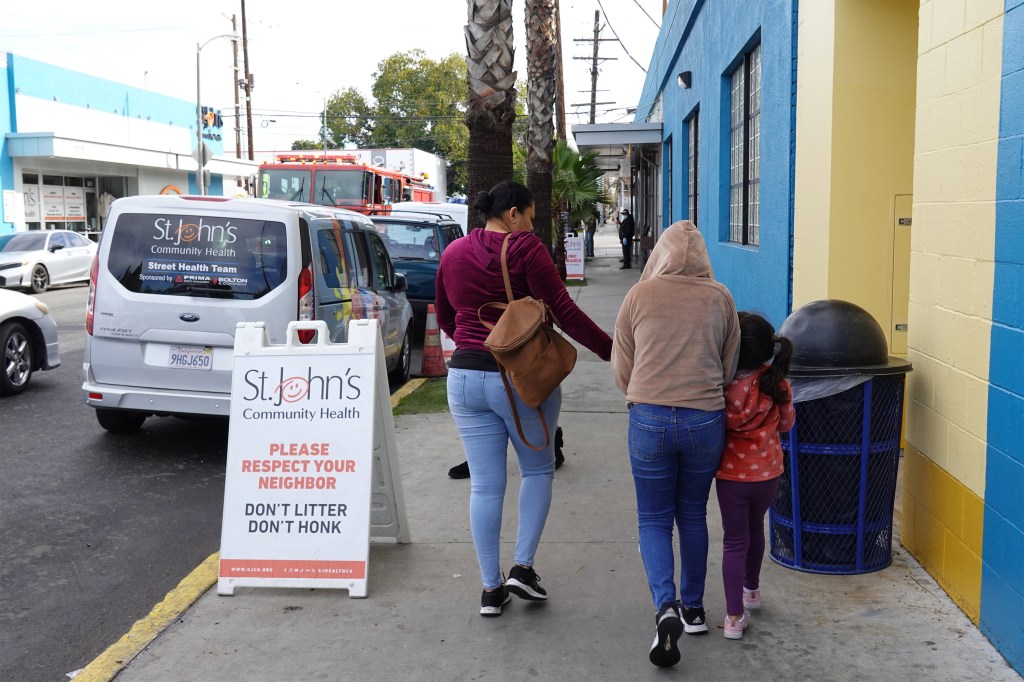The lobby at this St. John’s Community Health clinic in South Los Angeles bustles with patients. But community health worker Ana Ruth Varela is worried that it’s about to get a lot quieter. Many patients, she said, are afraid to leave their homes.
“The other day I spoke with one of the patients. She said: ‘I don’t know. Should I go to my appointment? Should I cancel? I don’t know what to do.’ And I said, ‘Just come.’”
Since Donald Trump’s return to the White House, fear of mass deportations carried out by U.S. Immigration and Customs Enforcement has gripped immigrant communities.
For years, a long-standing policy prevented federal immigration agents from making arrests at or near sensitive locations, including schools, places of worship, hospitals, and health centers. It was one of the first policies Trump rolled back in January, just hours after his inauguration.
Acting Department of Homeland Security Secretary Benjamine Huffman revoked the directive on Jan. 21. In an accompanying press release, a DHS spokesperson said the action would assist agents searching for immigrants who have committed crimes. “The Trump Administration will not tie the hands of our brave law enforcement, and instead trusts them to use common sense,” the statement said.
The speed of the change took Darryn Harris by surprise.
“I thought we had more time,” said Harris, chief government affairs and community relations officer for St. John’s.
Harris is racing to teach more than 1,000 St. John’s workers how to read warrants as they train for a new role — teaching patients their constitutional rights.
California Attorney General Rob Bonta, a Democrat, is advising clinics to post information about patients’ right to remain silent and to provide patients with contact information for legal-aid groups.
Bonta is also urging health care providers to avoid including patients’ immigration status in bills and medical records. His office directs that while staff should not physically obstruct immigration agents, they are under no obligation to assist with an arrest.
Even though immigration arrests took place in hospitals during Trump’s first term, the overall policy was still one of deference to “sensitive locations.” Now, however, DHS states that the previous rules hindered law enforcement efforts by creating sites where people without legal status could evade capture.
Matt Lopas, director of state advocacy and technical assistance for the National Immigration Law Center, said that in order for immigration officers to access health information or go into private spaces such as exam rooms, they must present a warrant signed by a judge.
“It’s incredibly important that every health care center has somebody who is trained to be able to read those warrants” and determine their validity, Lopas said.
In the San Francisco Bay Area, Zenaida Aguilera has been tapped to read warrants for La Clínica de La Raza. She is the compliance, privacy, and risk officer for the clinic network. If immigration agents show up, she’s on call for all 31 of the organization’s community clinics.
Aguilera is also now in charge of training hundreds of health staffers. She has trained about 250 thus far, but the majority of that work is yet to come.
“We have about, probably, a thousand more staff,” she said.
She fears the Trump administration will target California for immigration enforcement because of its approximately 2 million residents without legal status, the highest of any state, according to the Pew Research Center. In 2022, 11 million people were in the U.S. without authorization.
Aguilera said La Clínica plans to post patients’ constitutional rights in clinic lobbies and will provide resources such as contact information for legal-aid groups.
“We would like to just do the work of caring for our patients rather than train our staff on what to do if there’s an ICE official that tries to come into our clinics,” Aguilera said.
This article is from a partnership that includes NPR and KFF Health News.
